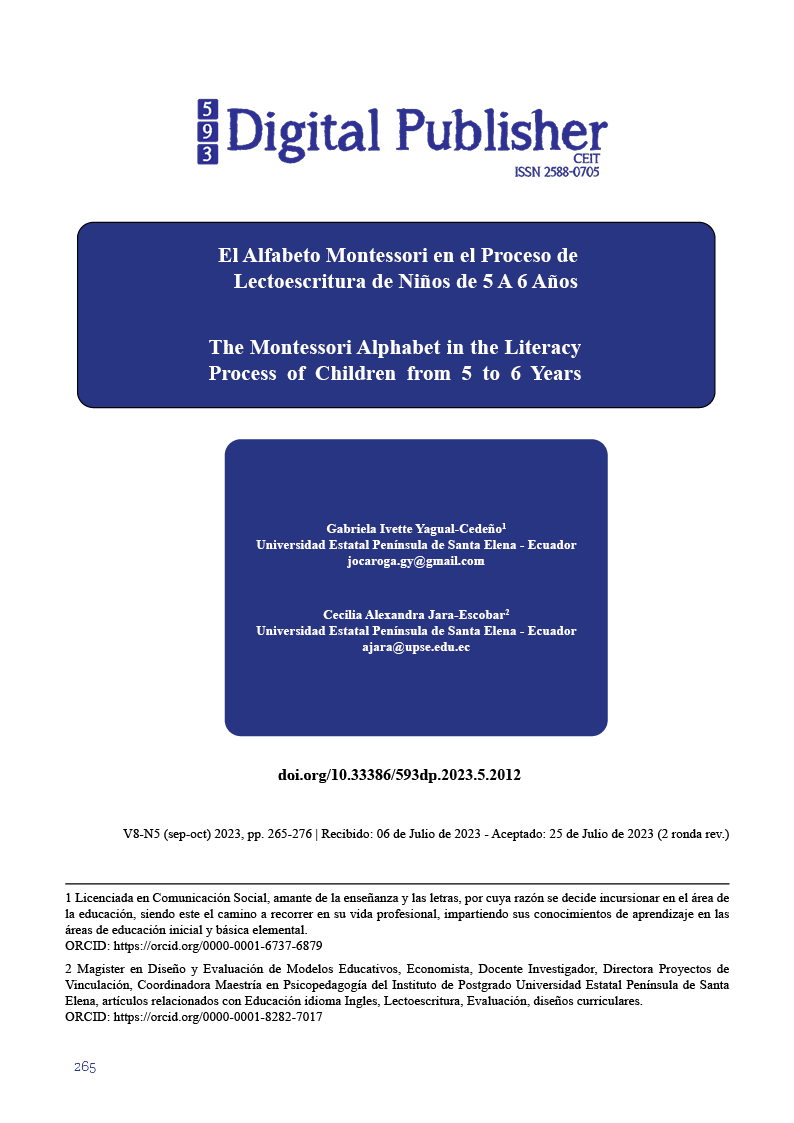The Montessori Alphabet in the Literacy Process of Children from 5 to 6 Years
Main Article Content
Abstract
Literacy is a fundamental skill in the learning process of children, it allows them to communicate and express themselves effectively with the outside world. The search for new ways of teaching is essential to ensure effective learning. The Montessori method has gained popularity due to its innovative, exploratory, and experiential student-centered approach. This bibliographical-quantitative research, of a descriptive nature with a multidisciplinary approach to psychopedagogy, was carried out in an educational institution in Santa Elena-Ecuador, where a group of 40 children between the ages of 5 and 6 who were learning to read and write received classes using the Montessori alphabet as a teaching resource, every day during the last semester corresponding to the 2022-2023 school year. The results were collected through surveys addressed to the representatives before and after completing the process, likewise, the record of qualifications in the area of comprehension and oral and written expression was taken into consideration, as well as an interview with the teacher to find out her criteria regarding the experience. The data shows a significant improvement in terms of greater understanding of letter sounds and greater ability to form words with the m, p, and s phonemes. The findings are consistent with previous research in which this methodology achieves optimal results in literacy skills, this suggests that the use of the resource is an effective and beneficial alternative in this fundamental process.
Downloads
Article Details

This work is licensed under a Creative Commons Attribution-NonCommercial-ShareAlike 4.0 International License.
1. Derechos de autor
Las obras que se publican en 593 Digital Publisher CEIT están sujetas a los siguientes términos:
1.1. 593 Digital Publisher CEIT, conserva los derechos patrimoniales (copyright) de las obras publicadas, favorece y permite la reutilización de las mismas bajo la licencia Licencia Creative Commons 4.0 de Reconocimiento-NoComercial-CompartirIgual 4.0, por lo cual se pueden copiar, usar, difundir, transmitir y exponer públicamente, siempre que:
1.1.a. Se cite la autoría y fuente original de su publicación (revista, editorial, URL).
1.1.b. No se usen para fines comerciales u onerosos.
1.1.c. Se mencione la existencia y especificaciones de esta licencia de uso.
References
Banco Interamericano de Desarrollo (BID). (2020). Social Digital. Obtenido de el aprendizaje de la lectura y escritura en la escuela y en el hogar : https://socialdigital.iadb.org/es/node/10020
Bravo. (2002). Scientific electronic library online. Obtenido de https://www.scielo.cl/scielo.php?script=sci_arttext&pid=S0718-07052002000100010
Dario, P. (Julio de 2019). EL PROCESO DE ENSEÑANZA-APRENDIZAJE DE LA LECTOESCRITURA:UNA REVISIÓN TEÓRICA. Santa Cruz de Tenerife, España.
Fondo de las Naciones Unidad para la Infancia. (Enero de 2021). Priorizar la educación para todos los niños y niñas es el camino a la recuperación. Obtenido de https://www.unicef.org/ecuador/comunicados-prensa/priorizar-la-educaci%C3%B3n-para-todos-los-ni%C3%B1os-y-ni%C3%B1as-es-el-camino-la-recuperaci%C3%B3n
Gomez. (2020). La búsqueda de información bibliográfica en. Obtenido de https://gredos.usal.es/bitstream/handle/10366/124041/PDFSC_La_busqueda_de_inf.pdf?sequence=1&isAllowed=y
Instituto Nacional de Evaluación Educativa (INEVAL). (Octubre de 2020). Informe de resultados Examen de Grado Año lectivo 2019-2020. Obtenido de https://cloud.evaluacion.gob.ec/dagireportes/sbciclo20/provincia/24.pdf
Lopez. (2021). PROPUESTA METODOLÓGICA PARA MEJORAMIENTO DE LA COMPRENSIÓN LECTO-ESCRITA CON NIÑOS Y NIÑAS DE PRIMER GRADO DEL CENTRO EDUCATIVO CHIQUILLADAS, OCAÑA (NORTE DE SANTANDER). Bogotà, Colombia.
Mendoza, A. (2021). APRENDIZAJE DE LA LECTOESCRITURA EN ÉPOCA DE PANDEMIA. Retos de la Ciencia, 13-22.
Ministerio de Educacion (MINEDUC). (2020). Santa Elena10. Obtenido de https://educacion.gob.ec/wp-content/uploads/downloads/2012/08/SANTA-ELENA10.pdf
Ministerio de Educacion MinEduc. (JULIO de 2016). SUBSECRETARÍA DE APOYO,SEGUIMIENTO Y REGULACIÓN DE LA EDUCACIÓN. Obtenido de SUBSECRETARÍA DE FUNDAMENTOS EDUCATIVOS: https://educacion.gob.ec/wp-content/uploads/downloads/2016/07/Instructivo-para-la-aplicacion-de-la-evaluacion-estudiantil.pdf
Montessori. (1912). The Montessori method. Frederick A. . Stokes Company.
Neil. (2018). Procesos y funamentos de la investigacion cientifica . Machala: Redes 2017.
Ruiz. (2019). DISEÑO DE UNA GUÍA PARA MEJORAR EL PROCESO DE ENSEÑANZA -APRENDIZAJE DE LA LECTOESCRITURA EN NIÑOS DE 6 AÑOS CON AYUDA DEL MÉTODO MONTESSORI. QUITO, Ecuador.
Salanova. (2021). Maria Montessori La pedagogía de la responsabilidad y la autoformación. Obtenido de https://educomunicacion.es/figuraspedagogia/0_montessori.htm
Simbaña. (2023). 593 Digital Publisher CEIT. Obtenido de https://www.593dp.com/index.php/593_Digital_Publisher/article/view/1720/1549
Tèbar. (2018). El cambio empieza en tu familia. España: Plataforma.
Valeria, B. (2020). El método Montessori como estrategia pedagógica en la enseñanza de la lecto-escritura. Barranquilla, Colombia.



